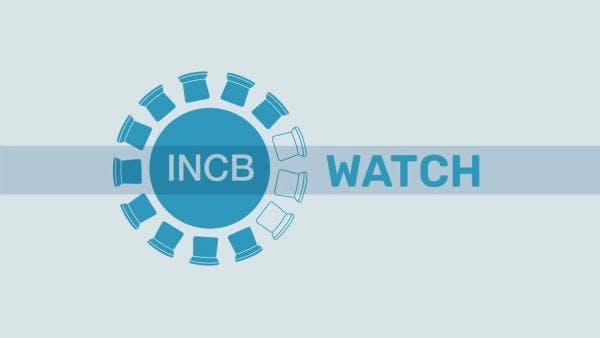Stephen Lewis’ closing remarks at the International Harm Reduction Conference 2013
Stephen Lewis -- founder of AIDS Free World, Distinguished Visiting Professor at Ryerson University in Toronto, and a Commissioner on the Global Commission on HIV and the Law – recently called the INCB a “hopelessly revolting outfit” and the people who run it “delinquents” (see the video of his remarks at this link. Mr. Lewis delivered his scathing attack on the INCB in a videotaped message to the final plenary of the International Harm Reduction Conference in Vilnius, Lithuania, a jam-packed four day event attended by more than 850 drug policy and harm reduction activists from around the world. Mr. Lewis made specific reference to INCB President Raymond Yan’s “obsession with criminalization,” noting that “legalization of cannabis for non-medical purposes worries him.”
Lewis shared his word search of the 2012 INCB Annual Report, which revealed that HIV/AIDS was mentioned 3 times in the 131 page document: twice in passing in respect to Portugal and the Caribbean, and once in saying that injecting use of prescription drugs increases the risk of HIV/AIDS. “Tellingly,” Lewis noted, “the phrase ‘harm
reduction’ appeared not once.”
Since the INCB continually refuses to address human rights issues, some of which fall under the right to health, saying explicitly that human rights fall outside its remit as a watchdog of the drug conventions (see 2012 Commission on Narcotic Drugs: Report of proceedings – IDPC report) Stephen Lewis’ accusation that Russian President Vladimir Putin should be indicted for crimes against humanity will doubtless fall on deaf ears. The fact that more than 100,000 IDUs under 30 years of age die in pain without access to morphine in Russia because it is
against the law for physicians to provide it is only one atrocity for which the Russian government should be called to account by the international community.
The Vilnius Conference was organized by Harm Reduction International and co-hosted by the Eurasian Harm Reduction Coalition, see here for details, against a backdrop of reduced global and local funding for needle and syringe exchange programs, escalating IDU HIV/AIDS and Hep C infections, and continuing forced “treatment” programs for drug users.
This post is authored by Dr. Katherine Irene Pettus, PhD Visiting Professor of Political Science and International Relations at the University of Pécs, Hungary.
Please contact Dr. Pettus (kpettus@ucsd.edu) for any queries about this posting.
Keep up-to-date with drug policy developments by subscribing to the IDPC Monthly Alert.
Regions
Related Profiles
- International Association for Hospice & Palliative Care (IAHPC)
- International Drug Policy Consortium (IDPC)
- International Narcotics Control Board (INCB)
